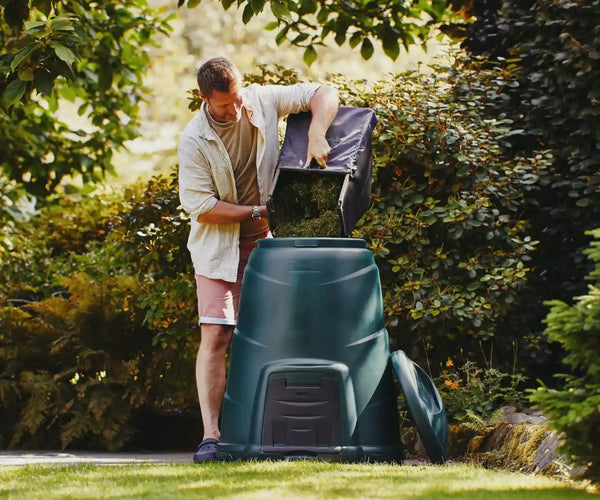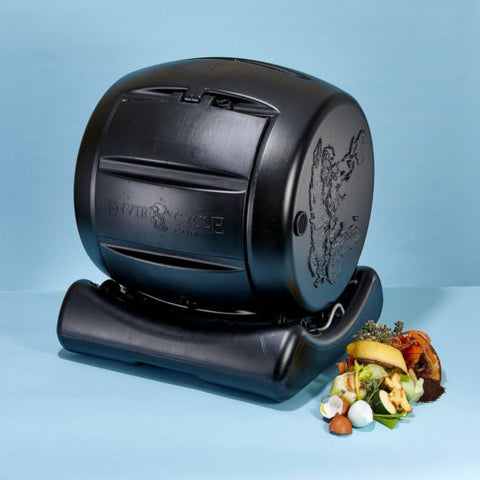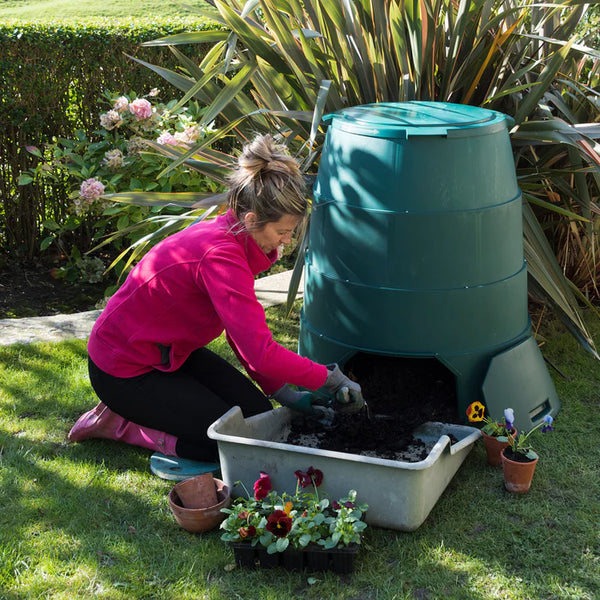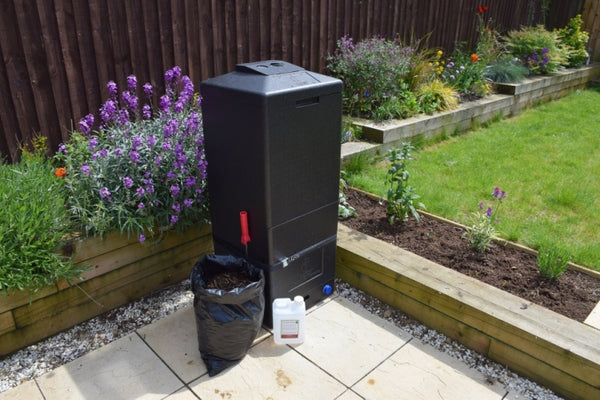Composting is a rewarding practice that transforms kitchen and garden waste into rich, nutrient-packed soil, benefitting both your garden and the environment. Selecting the right outdoor compost bin can significantly influence your composting success and efficiency. Here's a guide to the best outdoor compost bins for various needs and preferences.
Best Outdoor Compost Bins
- Best Budget Compost Bin: Blackwall Green Compost Converter
- Best Composter for Cold Climates: Exaco Aerobin 400
- Best Outdoor Compost Bin for Beginners: Envirocycle Composting Tumbler Bin
- Best Large Compost Bin: Modular Compost Bin
- Best Compost Bin for Versatility: Green Johanna 330 Litre Hot Composter
- Best Compost Bin for Speed: Hotbin Mk. 2 Composter
The Cleanest and Easiest Way to Collect Scraps For Compost
If you're tired of messy kitchen compost bins on your counter and always emptying your sink strainer, checkout Sepura's composting garbage disposal! All food washed down your sink is sent to an odor-proof compost bin, only liquids drain. This makes it especially good for homes on septic by keeping food out of your tank, and if you're on a sewer system it will keep food from clogging your plumbing!

Best Budget Outdoor Compost Bin
The Blackwall Green Compost Converter stands out for its affordability without sacrificing quality. Made from recycled plastic, this bin is ideal for gardeners looking to start composting without a hefty investment. Its simplicity and effectiveness make it a popular choice among beginners.
- Pros: Affordable, made from recycled plastic, easy to set up.
- Cons: Limited aeration, slower composting process.

Best Outdoor Composter for Cold Climates
The Exaco Aerobin 400 stands out for its insulated design, which retains heat, keeping the composting process active even in colder climates. Finding a composter that withstands cold temperatures while maintaining the decomposition process can be challenging. Insulated compost bins, often made from sturdy, double-layered materials, retain heat better, ensuring that your composting efforts continue throughout colder months.
- Pros: Insulated walls for heat retention, large capacity, and self-aeration system.
- Cons: Higher price point, bulky design.

Best Outdoor Composter for Beginners
The Envirocycle Tumbler is perfect for beginners, offering a simple, mess-free design with no assembly required.
- Pros: Compact design, no assembly needed, produces both compost and compost tea.
- Cons: Smaller capacity, higher cost for its size.
Best Large Outdoor Compost Bin
The Modular Compost Bin is perfect for gardeners with more extensive waste quantities. Its customizable design allows for expansion, making it suitable for large gardens or those looking to compost most of their organic waste.
- Pros: Expandable design, natural wood aesthetic, good aeration.
- Cons: Requires more space, assembly can be complex.

Best Outdoor Compost Bin for Versatility
The Green Johanna 330 Litre Hot Composter is renowned for its ability to compost a wide range of organic materials, including kitchen scraps and garden waste. Its efficient design accelerates the composting process, making it a versatile option for avid gardeners.
- Pros: Can compost a wide range of organic waste, including kitchen scraps, garden waste, and more.
- Cons: Larger footprint, may require more active management.

Best Outdoor Compost Bin for Speed
The Hotbin Mk. 2 Composter is designed for speed, turning organic waste into compost in significantly less time than traditional bins. Its insulated walls and airtight lid retain heat, speeding up the decomposition process.
- Pros: Fast composting, insulated for year-round use, and compact design.
- Cons: Higher price, requires careful balance of waste types for optimal performance.
What Materials Are Compost Bins Made Of?
Plastic Compost Bins: Lightweight and durable, plastic bins are popular due to their affordability and resistance to rot. Many are made from recycled materials, appealing to eco-conscious gardeners.
Wooden Compost Bins: Offering a natural aesthetic that blends into garden settings, wooden bins are favored for their breathability and insulation. They're typically made from untreated, rot-resistant woods like cedar.
Hot Compost Bins: These bins are insulated to retain heat, speeding up the composting process. They're ideal for gardeners in cooler climates or those looking to compost more quickly.
Wormery Bins: Wormeries use worms to accelerate composting, producing high-quality compost and liquid feed. They're great for small spaces and can even be used indoors.

How to Choose an Outdoor Composter
Size and Capacity: Consider the amount of waste you generate and the space available in your garden. Larger bins are better for more extensive gardens or higher waste volumes.
Stationary vs. Tumbling: Stationary bins are typically more affordable and better for large volumes, while tumbling bins offer ease of mixing and faster composting.
Compost Method: Your preferred composting method (traditional, hot composting, vermicomposting) will influence your bin choice. Each method has specific requirements for optimal results.
Compost Tea: Some bins collect 'compost tea,' a nutrient-rich liquid fertilizer. If this feature is important to you, look for a bin designed to collect it.
Filter or Seal: If you're concerned about odors or pests, consider bins with tight seals or filters. These features are particularly important for bins placed near living spaces.
Choosing the right outdoor compost bin can greatly enhance your gardening and composting experience. Whether you're a beginner or an experienced gardener, there's a compost bin suited to your specific needs, making it easier and more efficient to recycle your organic waste into valuable compost for your garden.



